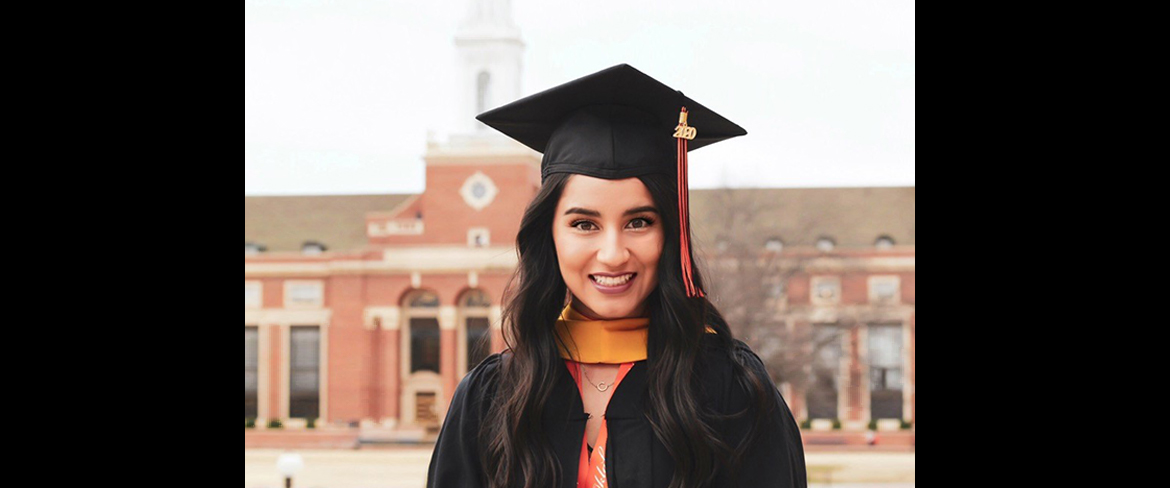Like many freshmen, Oklahoma State University graduate Corina Hernandez took a few semesters to cement her chosen major of Human Development and Family Science in the College of Human Sciences. But then, while looking for electives to fill out her schedule, she enrolled in an intro to communication disorders course in CAS’s Department of Communication Sciences and Disorders.
“I loved everything about it,” said Hernandez, who hails from Elk City, Oklahoma. “And once I got my feet wet in [CDIS], it was straight ahead from there. I was so engaged in every lecture. I remember telling people how easy it was to go to class because everything was so interesting.”
Hernandez continued taking CDIS courses and “ended up not being able to choose between majors, so I did a double major,” she said. “And it all started with that first class.”
Since her initial foray into Communication Sciences and Disorders, Hernandez has graduated with degrees in CDIS and HDFS. And just this spring she added a master’s in speech language pathology. Her work as a graduate student landed her one of two university-wide Spring 2020 Honorary Graduate Commencement Marshal awards, which includes a monetary prize and the chance to lead her fellow graduates into commencement. However, because COVID-19 forced graduation to the virtual sphere, Hernandez will return in December for the latter duty.
“I'll be happy to see everyone again,” Hernandez said, who is moving to Ardmore, Oklahoma, to start her career. “For six years, it will have been the longest I've been away from campus.”
According to her former supervisor, Scott King, Hernandez’s connection to OSU campus is strong thanks to years of mentoring students—and then other mentors—in the P.E.T.E. Project, a College of Human Sciences living-learning program.
“When we ask students to give of themselves it can be very draining, as they are still students themselves,” said King, the P.E.T.E. Project coordinator. “Corina focused her efforts on pouring into our mentors so that they could recharge and develop as students and professionals. Corina has made a remarkable impact on our campus. The benefits to others will be shown for years to come due to her legacy of service at OSU.”
In addition to mentoring, Hernandez also worked as a graduate research assistant for Dr. Ramesh Kaipa, the head of CDIS. She said the position prompted her to complete a thesis as part of her master’s degree.
“My graduate program wasn't one that required a thesis,” Hernandez explained, “but because I didn’t do any undergraduate research with professors, I always felt like I had missed out on broadening my horizons and getting experience with something new.”
Kaipa said he remembers presenting a research idea to Hernandez in 2018 that focused on speech patterns in Parkinson’s patients.
“I could see that spark in her eyes that indicated, ‘Yes, I am definitely on board,’” Kaipa said. “She was genuinely interested in contributing to the knowledge base that would help speech-language pathologists assess and treat patients with Parkinson’s disease better.”
Hernandez spent nearly 100 hours interviewing and recording people with and without Parkinson’s disease—a level of work comparable to doctoral students completing a dissertation, according to Kaipa— to analyze factors that contribute to speech deficits. Hernandez said that they found articulation, speech rate and prosody (e.g. rhythm and intonation) to have the most significant effects on Parkinson’s patients’ speech.
“So now, for continuing research, maybe Dr. Kaipa's next research assistant or another student looking to do a thesis project could do another study like this but on a greater scale,” Hernandez said, explaining that there are still gaps in research.
As for herself, Hernandez is venturing outside of academic research and into one-on-one therapy at a pediatric clinic.
“I'm looking forward to just doing therapy—spending time with clients and patients,” Hernandez said. “I think I was really drawn to this field because you see your clients so frequently and you can see them progress. And after they leave, you're still thinking about them. You're thinking about what you can do better for them in the next session.”
Hernandez’s mentality of service—evident throughout her time at OSU—is reflected in what she described as a shift in perspective concerning the medical professionals she now calls her colleagues.
“I feel like it's much more tangible now, how much every single medical professional gives to their career, and how much time and energy they have to put into being good at what they do,” Hernandez said. “I have a better understanding of what kind of sacrifice people in the medical field make. It’s eye-opening.”

